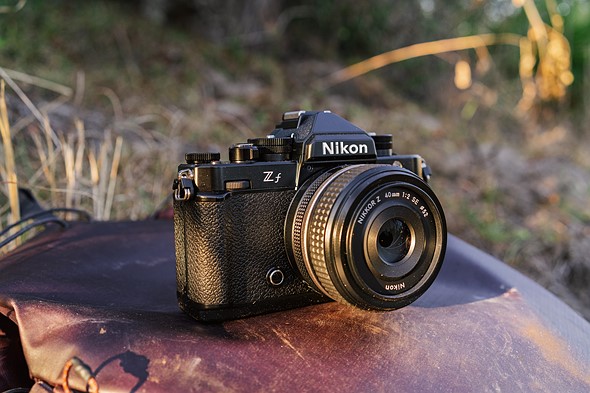
Announced in 2004, the Olympus C-8080 Wide Zoom wasn't the first camera with a focal range starting at 28mm, nor was it the highest resolution camera at the time with its 8 megapixel CCD. What made the C-8080 interesting was the amount of work that Olympus put into the lens, claiming that it was designed to be on par with the Zuiko Digital lenses found on its DSLRs.
The lens had an equivalent focal length of 28-140mm and an impressive maximum aperture range of F2. 4-3. 5. It used three ED glass elements to reduce chromatic aberration, something not normally found on a compact camera. In DPReview's testing, seeing CA in the real world was a rarity. The lens was threaded and supported both telephoto and wide conversion lenses. One bummer about the lens was that the zoom was electronically controlled, rather than mechanically, a feature found on the Minolta DiMAGE A2 and Sony DSC-F828 at the time.
Those are who are familiar with the Olympus E-10 will definitely notice some similarities with the control layout and LCD/viewfinder placement.
The C-8080WZ wasn't the smallest camera out there, but there's a lot of glass plus an EVF and tilting LCD that you'll see in a moment. It was made of magnesium alloy that Phil Askey said was 'heavier grade than we're used to seeing. ' Phil also complimented the well-designed front and rear grips.
Something worth pointing out is that the camera had an external phase detection sensor (to the left of the Olympus logo). Phil's review praised the fast AF speeds of the camera, though he was less keen about how quickly the lens zoomed and that there were only five 'stops' along the way.
The C-8080's 1. 8" LCD could be pulled away from the body and tilted up or down. The resolution of 134k wasn't great, but hey, it was 2004 (the user interface from back then is worth a look, as well). There's also a pretty big electronic viewfinder, which had 240k dots.
The camera had two memory card slots: one for CompactFlash and the other for – you guessed it – xD Picture Cards. Sadly, despite all of the semi-pro features on the C-8080WZ, it only had one control dial.
So what about photo quality? The C-8080WZ tied for the best resolution among a group of five 8MP cameras, with low noise at high ISOs. The lens had very little barrel distortion but some unexpected pincushion distortion, though Phil noted that it was unlikely that you'd notice this in the real world.
In the end, the C-8080 Wide Zoom earned a coveted 'highly recommended' award, due in large part to its lens. The main negatives were the aforementioned zoom speed and number of stops issues as well as camera lockup while Raw images are saved and an aging menu system.
Do you have fond memories of the C-8080 Wide Zoom? Share them in the comments below. And let us know if you have suggestions for future Throwback Thursday articles!
Read our Olympus C-8080WZ Review
Olympus C-8080WZ Sample Gallery
$(document). ready(function() { SampleGalleryStripV2({"galleryId":"7875368385"}) }). dpreview.com
2017-5-19 13:00

















